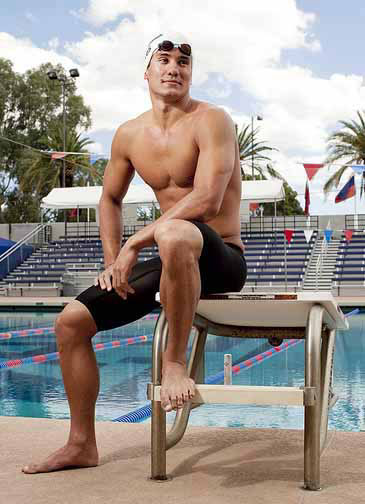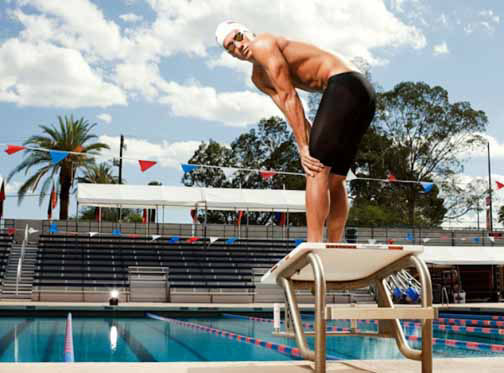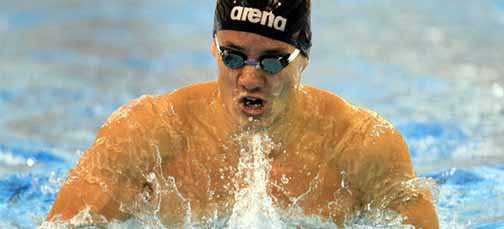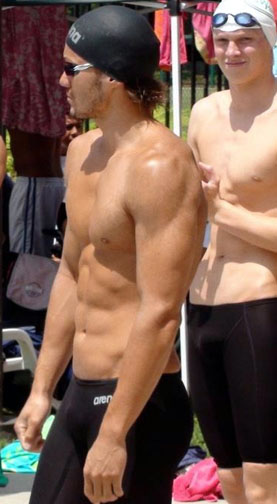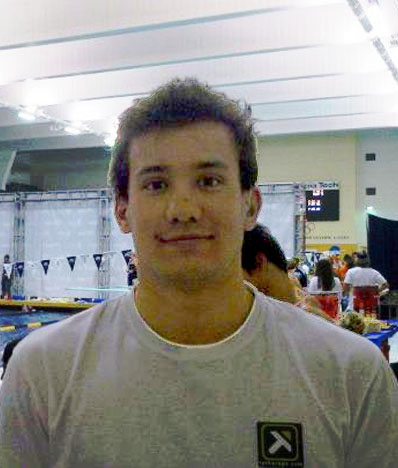Tags
The roar of the crowd, the cacophony of fans cheering you on, the playing of your nation’s anthem while you stand on the winners’ podium accepting your medal, these are the sounds that every Olympian remembers from the Games. Not so for U.S. swimmer Marcus Titus who was born deaf. More important to him were the sounds of officials at the swimming pool; that’s one arena he’s done battle in and already won. As for his skeptics, he just doesn’t hear them.
The hunky 26-year-old U.S. National Team member posted the fastest time by an American in the 100-meter breaststroke this year and has a good chance of qualifying for the Olympic Team at the Trials in late June. But in a sport where the difference between wining and losing can be measured in a tenth of a second, Titus was at a disadvantage. The rules used by FINA, swimming’s international federation, the IOC, and USA Swimming allow for the use of a strobe light to signal the start of the race for deaf and hearing impaired swimmers. Titus pointed out that that was not enough. It lets deaf and hearing impaired swimmers know when the race begins, but there are no hand signals or indicators used to let the swimmers know to step up or take their marks.
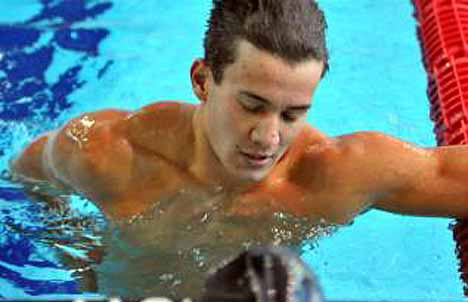
The cute 26-year-old hunk stands a good chance of qualifying for an Olympic berth at the Trials in June.
“I have to rely on other swimmer because I don’t know what they are doing,” Titus explains. “I can’t hear anything so if the swimmer get on the block then I get up because of what they do, so it is like a delay of starting everything. I am the last person to take my mark and I don’t know how soon will they start the timer off and maybe I will be late.”
According to the 5’11” Tucson native and University of Arizona graduate, visual race starts that only use the strobe light have less than a 50 percent accuracy. “Even though I remind the officials and referees time and time again, they are constantly forgetting or incorrectly executing the hand signals that I request at each one of my swim meets,” says Titus. “This has been causing too much tension and stress in my swims.”
Other swimming organizations use hand signals to ready swimmers and to provide hearing impaired competitors the same prep as their less disadvantaged competitors. His request to USA Swimming to incorporate a procedure that can be followed by hearing, deaf, and hearing impaired individuals fell on deaf ears.
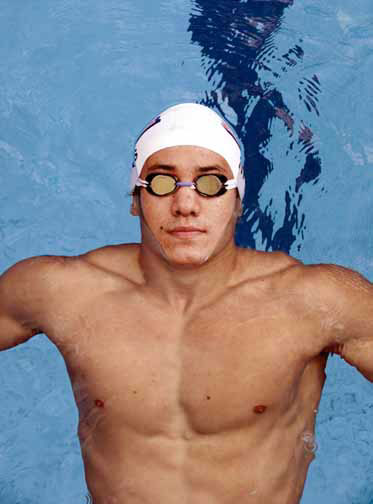
“Being deaf allows me to block all the noise that could be a distraction when I’m preparing to swim,” says Titus
USA Swimming program operations VP James Sheehan says that USA Swimming currently follows FINA protocol and will do so at the Omaha qualifiers. Sheehan wrote in an April 17. 2012 letter to Titus that the top referees and starters from the United State will be working the Olympic Trials, and he insists they are “well versed in the procedures to be used for starts for the deaf and hearing impaired.” Per FINA protocol, however, the referees will not be using hand signals.
Titus disagreed citing incidents where the starters messed up the hand signals. “It’s not fair to me when I am swimming among the best swimmers in the country and world to have an additional stressor,” he said. “Why do I have to worry every time I get up on the block. Should I carry this additional weight with me constantly? I want to be excited and just as focused as the swimmer next to me. I only want to worry about my race, not whether the official is going to give me a signal or not. Is that too much to ask?”
With U.S. Swimming ignoring his needs and failing to do the right thing, Titus turned to what is becoming one of the more effective ways of gaining public support for a cause: social media. He started a Facebook page “USA Swimming Discriminates Against Deaf Swimmer’ to plead his case to the world. “Although I have worked with USA Swimming for months to standardize race procedures for deaf swimmers, USA Swimming is not accommodating my request to incorporate hand signals at the Olympic trials,” Titus wrote on Facebook. “This has become an unfortunate case of discrimination at a time when I should be receiving a lot of support for this once in a lifetime opportunity.”
The response to his social media efforts was strong enough to force U.S. Swimming to reconsider its position. They have agreed to Titus’ request stating that “USA Swimming will use hand signals at the upcoming Olympic Trials in order to accommodate our deaf and hearing-impaired swimmers.” When Titus steps up to the blocks in Omaha, starters will be using hand signals to give him the pre-start countdown his hearing competitors receive.
The IOC and FINA are a different battle. They are not planning to use hand signals at the London Olympics. That fight is one that Titus has shelved for now. First, he has to work on his swimming to land one of the top two spots at the Olympic Trials in order to win a berth to the Games. With USA Swimming’s recent decision at least now he will be competing on a level playing field. And his steady improvement since he attempted to qualify for the 2008 Olympics places him in a good spot to do so. “I’m motivated to show that I can compete along side the country’s best, even if I can’t hear the starting gun and the screaming fans,” he says.
The 5’ 11” Tucson native began competitive swimming at the age of 12. ”My mom encouraged me to try out for swimming during high school my freshman year since I didn’t really enjoy sports that involved running and sweating,” he says. His initial reaction to the sport was not good. Titus hated practice and hated wearing Speedos. But after his first meet, and a surprising win, he fell in love with swimming. “I turned out to be a competition junkie,” he says. “I love to race and it makes me feel good.”
At the Olympic Trials in 2008 he placed 11th in the 100m breaststroke, his chosen event. Now Titus is one of the top breaststrokers in the world. Currently he has the 32nd fastest 100m breaststroke time in the world. At the 2011 Pan American Games, his first international event, he won the bronze medal. And at the Indianapolis Grand Prix held at the end of March this year he swam to a first place win. His chances come June look good.
Titus said he never lets his inability to hear slow him down and thanks his parents, Mark and Mieko, for his can-do attitude. The couple discovered their son was deaf when at the age of 3 they took him to see a specialist because he was still not talking. They made sure Marcus never felt sorry for himself. They took him out of Arizona State School for the Deaf in Blind in Tucson when he was in the fifth grade and put him in a regular public school, where everybody else could hear.
He went through an adjustment period in the beginning, being stared at while an interpreter communicated in sign language in the classroom. He couldn’t rely on his hearing aid. But he quickly adapted. Titus made honor roll every year, continuing through his four years at Tucson Flowing Wells High, where he was a state champion his senior season in 2004 in the 100 breaststroke.
“I’ve always just wanted to be treated like anyone else,” says Titus, who speaks clearly, thanks to early speech therapy. “With the support of my family, friends, and interpreter, I’ve been able to succeed in this sport. I’ve never let my inability to hear to slow me down, in or out of the pool.”
Titus does not view his disability as a handicap in the pool. “It helps me stay in my own world, helps me focus on what I need to do,” he says. For now that focus is on his timing and his kickstroke so he can reduce his drag in the water and improve his times.
“I’m pretty confident I’ll get better in time for the trials,” he says adding that making the Olympic team would give him the ultimate confirmation. “I know I have the strength to do it,” Titus said. “It’s going to come down to who touches the wall first.”
Should Marcus prevail in his bid to win a spot at the Olympics, rising out of the water to see that he has won will be yet another moment for him spent in silence. But the joy and pride in the faces of his family and friends will speak volumes. And his nation will hear of his accomplishment.
[‘The XXX Games’ are a series of posts about hot Olympians, gay competitors – both present and past – and general articles about the 2012 London Olympics of interest to gay men. So, yeah, lots of hot male eye candy. Click the XXX Games graphic below for additional news, stories, and pictures.]

